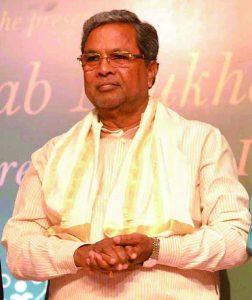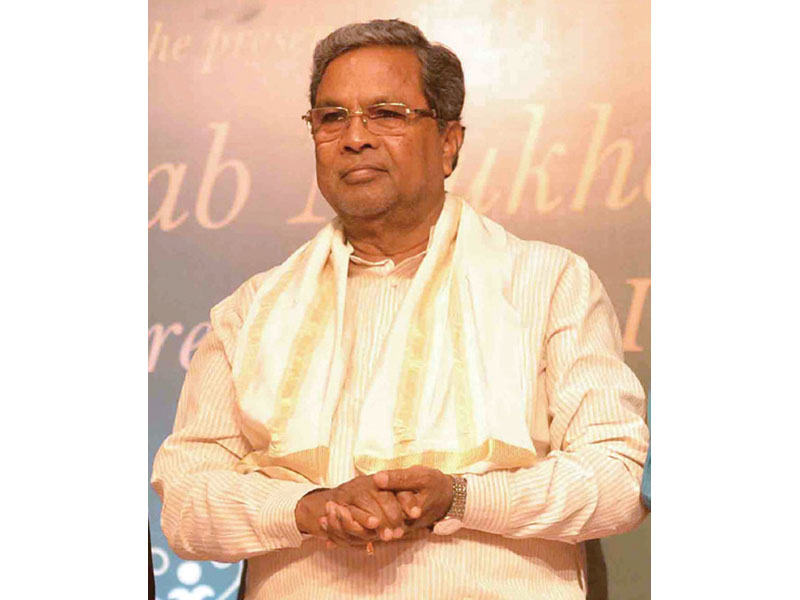No products in the cart.
Karnataka: Language wars fallout
Reshma Ravishanker (Bangalore)

Chief minister Siddaramaiah
After Tamil Nadu and Maharashtra, Karnataka (pop.69 million) is the latest state to reject the three-language formula mandated by the National Education Policy (NEP) 2020, and is set to legislate its own State Education Policy (SEP). NEP 2020 mandates all children in primary-secondary school learn three languages viz, their mother tongue, a “foreign language” (English) and any other native Indian language preferably Hindi. On June 30, chief minister Siddaramaiah announced that the Congress government supports implementation of a two-language formula (state language Kannada and English) in Karnataka schools.
Earlier on June 29, the BJP-Shiv Sena (Shinde) coalition government in Maharashtra withdrew its Government Resolution directing all schools to implement NEP 2020’s three-language policy after opposition parties protested imposition of Hindi (see p.20). It’s pertinent to note that way back in 1965, when Hindi was declared the national language, riots broke out in southern India, in particular Tamil Nadu, protesting “Hindi imperialism”. Since then, Tamil Nadu has followed a two-language policy (English and Tamil), a commitment it has reaffirmed by rejecting NEP 2020 in toto and formulating its own SEP.
Following Tamil Nadu’s lead, Karnataka’s Congress government has constituted an expert committee chaired by former University Grants Commission chairman Sukhdeo Thorat to draft its own State Education Policy. According to some reports, in its SEP, due to be submitted shortly, the Thorat Committee has endorsed the two-language policy. Currently, Karnataka’s 75,869 government and private schools follow the three-language policy under which they teach Kannada, English and Hindi.
Some private school associations in the state have opposed the Congress government’s intent to discontinue the three-language policy in favour of teaching two languages. They argue that the NEP 2020’s three-language mandate promotes “multilingualism and the power of language in teaching and learning” and it clearly states that “no language will be imposed on any State. The three languages learned by children will be the choices of states, regions, and of course the students themselves, so long as at least two of the three languages are native to India”.
Comments D. Shashi Kumar, general secretary, Associated Managements of Primary and Secondary Schools in Karnataka which has a membership of 20,000 private schools statewide: “The three-language formula aligns with the spirit of Article 29 (1) of the Indian Constitution, which protects the right of citizens to preserve their distinct language, script, or culture. Encouraging students to learn three languages promotes linguistic diversity and strengthens cultural identity. Research shows that early multilingual exposure enhances children’s cognitive development, boosts their attention spans and improves math skills. Rather than banning the teaching-learning Hindi, the focus should be on promoting regional and sub-regional languages such as Sanskrit, Urdu, Tulu, and Konkani. Over 75,000 teachers in Karnataka are currently teaching third languages — their livelihoods will be at stake if the two-language policy is adopted,” says Kumar.
However, some educationists interpret NEP 2020’s resurrection of the three-language debate as yet another covert attempt by the BJP government at the Centre to impose Hindi on peninsular Indian states. According to Maya Menon, founder of the Bengaluru-based The Teacher Foundation, implementing NEP 2020’s three-language formula requires North Indian states to teach a southern regional language. “The main reason why southern states are opposed to this policy is because while the Centre expects Hindi to be taught in their schools, there’s no reciprocal acceptance by North Indian states to teach southern languages,” says Menon.
Beyond political opposition to the BJP and Hindi imperialism, switching to a two-language policy — Kannada and English — offers the state’s ruling Congress government commercial benefits. The two language policy will enable the Kannada language lobby and local politicians deeply involved in teacher recruitment, appointments and textbook writing and printing rackets, to reap rich monetary dividends. The number of captive children who will require Kannada textbooks will triple.
With the Thorat Committee reportedly set to recommend the adoption of the two-language policy in Karnataka’s 75,869 schools, implementation of NEP 2020, which celebrated its fifth anniversary on July 29 (see cover story), has been adversely affected with the southern states including Karnataka set to reject it in toto.
Also Read: Karnataka issues daily 25-point safety checklist for school headmasters
Post Views: 135















Add comment